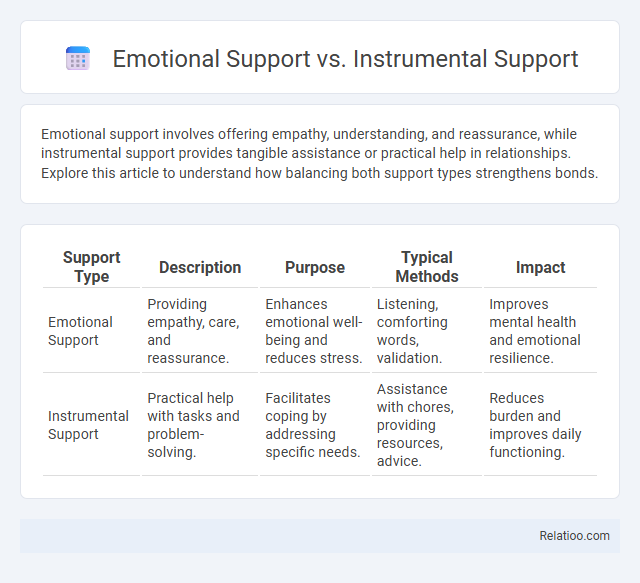Emotional support involves offering empathy, understanding, and reassurance, while instrumental support provides tangible assistance or practical help in relationships. Explore this article to understand how balancing both support types strengthens bonds.
Table of Comparison
| Support Type | Description | Purpose | Typical Methods | Impact |
|---|---|---|---|---|
| Emotional Support | Providing empathy, care, and reassurance. | Enhances emotional well-being and reduces stress. | Listening, comforting words, validation. | Improves mental health and emotional resilience. |
| Instrumental Support | Practical help with tasks and problem-solving. | Facilitates coping by addressing specific needs. | Assistance with chores, providing resources, advice. | Reduces burden and improves daily functioning. |
Understanding Emotional Support
Emotional support involves providing empathy, care, and reassurance to help individuals manage stress and emotional challenges effectively. Unlike instrumental support, which offers tangible aid such as financial help or assistance with tasks, emotional support focuses on nurturing feelings of security and belonging. Supportiveness embodies the overall attitude of responsiveness and understanding, emphasizing emotional validation as a crucial component in fostering well-being.
Defining Instrumental Support
Instrumental support refers to the tangible, practical assistance that helps individuals manage daily tasks and solve specific problems, such as providing financial aid, transportation, or help with chores. Emotional support involves offering empathy, understanding, and caring to help individuals cope with stress or emotional challenges. Your ability to distinguish between these types of support enhances the overall supportiveness you provide, ensuring that both practical needs and emotional wellbeing are addressed effectively.
Key Differences Between Emotional and Instrumental Support
Emotional support involves providing empathy, care, and reassurance to help individuals manage stress and emotional challenges, while instrumental support refers to offering tangible assistance such as financial help, practical aid, or services. Emotional support enhances psychological well-being by fostering feelings of being understood and valued, whereas instrumental support addresses concrete needs to solve specific problems or alleviate burdens. Supportiveness encompasses both types, reflecting the overall quality and availability of support that promotes resilience and coping in diverse situations.
Psychological Benefits of Emotional Support
Emotional support provides psychological benefits by enhancing your sense of belonging, reducing stress, and fostering resilience through empathy and understanding. Unlike instrumental support, which focuses on tangible assistance such as tasks or financial help, emotional support directly impacts mental health by validating feelings and promoting emotional stability. Supportiveness encompasses both emotional and instrumental aspects, but the unique value of emotional support lies in its capacity to nurture positive self-esteem and psychological well-being.
Practical Benefits of Instrumental Support
Instrumental support provides tangible assistance such as financial aid, transportation, or help with tasks, directly addressing immediate practical needs and reducing stress in challenging situations. Emotional support offers empathy and understanding, fostering psychological well-being, while supportiveness reflects the overall quality and responsiveness of support within relationships. Prioritizing instrumental support enhances problem-solving capacity and promotes resilience by ensuring concrete resources are available during crises.
When Emotional Support Matters Most
Emotional support becomes crucial during times of psychological distress, such as grief, anxiety, or trauma, where empathy, understanding, and validation help individuals cope with emotional pain. Instrumental support, involving tangible aid like financial help or assistance with tasks, proves more effective during practical challenges or crises that require concrete solutions. Supportiveness, reflecting the overall quality and responsiveness of the support network, influences long-term well-being but emotional support specifically matters most when managing intense feelings and fostering mental health resilience.
Situations Requiring Instrumental Support
Situations requiring instrumental support often involve practical assistance such as helping with daily tasks, providing transportation, or offering financial aid during crises. Emotional support focuses on empathy, encouragement, and understanding, while supportiveness is a broader attitude of being helpful and responsive. Instrumental support directly addresses tangible needs, making it crucial during emergencies or when individuals face physical or logistical challenges.
Balancing Emotional and Instrumental Support in Relationships
Balancing emotional and instrumental support in relationships enhances overall well-being by addressing both feelings and practical needs, fostering deeper connection and trust. Emotional support involves empathy, validation, and understanding, while instrumental support provides tangible help like tasks or resources, which together create a comprehensive support system. You benefit most when partners skillfully combine these forms, adapting to changing situations to maintain resilience and harmony.
Cultural Influences on Support Preferences
Cultural influences significantly shape preferences for emotional support, instrumental support, and supportiveness, with collectivist cultures often emphasizing emotional closeness and communal empathy, while individualist cultures prioritize practical assistance and autonomy. Research shows that East Asian cultures tend to value indirect emotional support and collective coping strategies, whereas Western cultures more frequently seek explicit encouragement and problem-solving help. Understanding these cultural nuances enhances the effectiveness of social support by aligning support types with culturally endorsed expressions of care and interdependence.
Enhancing Wellbeing Through Combined Support Strategies
Emotional support provides empathy and understanding, fostering a sense of belonging, while instrumental support offers practical assistance to address tangible needs. Supportiveness reflects the overall quality and responsiveness of these interactions, influencing how effectively support contributes to your wellbeing. Combining emotional and instrumental support strategies creates a comprehensive support system that enhances resilience and promotes holistic mental and physical health.

Infographic: Emotional Support vs Instrumental Support
 relatioo.com
relatioo.com